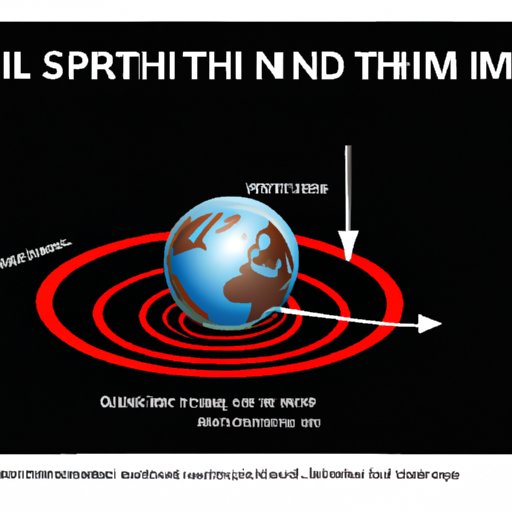Introduction
When you look up at the sky, it may seem like the earth is standing still. But in reality, our planet is constantly moving. Not only is it orbiting around the sun, but it is also spinning on its axis. This movement plays a crucial role in shaping our world as we know it, from the day and night cycles to the weather patterns we experience. But have you ever stopped to wonder why the earth spins? In this article, we will explore the scientific and philosophical aspects of this fascinating phenomenon.
The Scientific Explanation
The earth’s spin is a result of its formation and the forces that govern its motion. Our planet was born from a cloud of gas and dust that collapsed under its own gravitational pull. As it collapsed, it began to spin faster and faster, much like an ice skater pulling in their arms to increase their rotation.
The physics behind the earth’s spin can be explained through a few key concepts. First, there is the law of conservation of angular momentum, which states that a rotating object will continue to spin at the same speed unless acted upon by an external force. In the case of the earth, this external force is primarily the gravitational pull of the sun and the moon.
Another important concept is gravity, which is responsible for holding the earth together and keeping it in a stable orbit around the sun. As the earth spins, centrifugal force tries to pull matter away from the center, but gravity pulls it back towards the center, keeping it in place.
Historical Perspective
The movement of the earth has been a subject of fascination and wonder for humans for millennia. Early civilizations believed that the earth was stationary and that the sun, moon, and stars moved around it. It wasn’t until the 16th century that the Polish astronomer Nicolaus Copernicus proposed the heliocentric model, which placed the sun at the center of the solar system.
Over time, scientific observations and experiments provided more evidence for the earth’s movement, such as the Foucault pendulum, which demonstrated the rotation of the earth. Today, our understanding of the earth’s spin is based on a combination of historical observations and modern scientific theories.
The Impact of the Movement
The earth’s spin has a profound impact on the world around us. One of the most obvious effects is the day and night cycle. As the earth rotates, different parts of the globe are exposed to the sun or in shadow, creating the cycle of day and night.
The earth’s spin also influences weather patterns and ocean currents. The Coriolis effect, which is a result of the earth’s rotation, causes air and water to move in different directions in the northern and southern hemispheres. This effect plays a key role in shaping weather systems and ocean currents, which in turn affect everything from agriculture to transportation.
Understanding the earth’s spin is important for many fields of study, from meteorology to geology. Researchers use this knowledge to predict weather patterns, track the movement of ocean currents, and study the formation of the planet.
The Future of the Earth’s Spin
The earth’s spin is not constant and may change over time due to various factors. Climate change, for example, may alter the balance of ice sheets and ocean currents, which could affect the earth’s rotation. Geological activity, such as earthquakes and volcanic eruptions, could also lead to changes in the planet’s spin.
While these changes may not be immediately noticeable to us, they could have significant consequences. For example, changes in the earth’s spin may affect the accuracy of GPS systems, as well as alter climate patterns in ways that could impact human populations.
Mysteries of the Earth’s Spin
Despite our modern understanding of the earth’s spin, there are still many unanswered questions about this phenomenon. For example, scientists are still unsure whether the speed of the earth’s rotation has varied over time, and if so, what factors may have contributed to these changes.
Another mystery is what would happen if the earth suddenly stopped spinning. While this is highly unlikely to occur, it is still an intriguing question to ponder. If the earth were to stop spinning, the day and night cycle would no longer exist, and the entire planet would be exposed to extreme temperatures and weather conditions.
The Philosophical Angle
While the earth’s spin can be explained through scientific concepts, it also has a deeper philosophical significance. Throughout history, humans have looked to the stars and the heavens for answers and meaning. The earth’s spin represents both our dependence on the natural world and our fascination with the mysteries beyond it.
In human culture, the earth’s movement plays a significant role in religion and mythology. Many creation stories involve a celestial being who spins the world into existence, while others use the cycles of the sun and stars to mark the passage of time. The earth’s spin also reminds us of our place in the greater universe, and how interconnected all things are.
Conclusion
In conclusion, the earth’s spin is a fascinating and complex phenomenon that has captured human imagination for centuries. From its scientific explanation to its impact on our world, there is much to explore and understand about this essential aspect of our planet. Ultimately, the earth’s spin reminds us of the workings of the natural world and our ongoing quest to understand its wonders.
